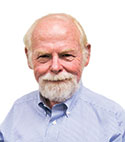Energy issues
In 1955, science fiction author Philip K. Dick wrote “Autofac,” a short story about autonomous machinery. After a devastating war, humans discover that machines are restarting themselves and working on their own projects. “ ‘They’re building,’ O’Neill said, awed. The machinery was building a…replica of the demolished factory.” (Ekbia, H. R., B. Nardi, S. Sabanovic, “On the margins of the machine: Heteromation and robotics,” In iConference 2015 Proceedings.)
I have written about automation previously in these pages—of advance machines and their troubling propensities when left to their own devices, such as developing their own languages among themselves. As an industry leaning more and more on robotics and AI, the scenarios can be scary, especially when applied to critical operations in sensitive areas. But, some emerging scenarios now envision a future in which robots coexist with humans and, in fact, they work together. Sound good? Maybe.
One scenario, the result of research by Hamid Ekbia and Bonnie Nardi cited above, introduces the idea of heteromation. The idea explores a new division of labor between machines and humans, in which people provide value to the economy with little or no compensation. The idea focuses on computerization of the economy—and everyday life—that has transformed the division of labor between humans and machines, shifting many people into work that is hidden, poorly compensated, or accepted as part of being a “user” of digital technology.
Through our clicks, logins, form fillings, emails and posts, we are, willingly (some might argue that we are forced) participating in digital activities that yield economic value to others, but little or no return to us. In other words, when you respond on a social website or fill out a form to make a purchase from a web vendor, you are feeding information, no matter how trivial, to the AI/robotic community—information that they can pool into a meaningful database that feeds operational and developmental details to the AI/robotic world. Ekbia and Nardi call this kind of participation heteromation. In their book “Heteromation and Other Stories of Computing and Capitalism,” they explore the social and technological processes through which economic value is extracted from digitally mediated work, the nature of the value created, and what prompts people to participate in the process.
From that point, it is a logical step to conclude that, while AI and robotics may pose dangers if left to their own devices, that scenario is unlikely because, to function optimally, AI and robotics require human input, even if that input, at the individual level, doesn’t appear to be terribly significant. Heteromation is another take on the increasing role of AI and robotics. As these technologies become increasingly prevalent in oil and gas operations, it might be comforting to have human input. It also will be important to be somewhat cautious about the content of that input.
The impact of robotics, AI and heteromation is not the only thing we should focus on. Although, with the price of oil trending up, it becomes increasingly difficult to focus on things more than a quarter or two out, even if they are potentially damaging. That is especially true of abandonment issues, at a time when lease sales are going very well.
According to the BBC, “UK regulators have declared that oil and gas exploration is "very much alive" after awarding 123 offshore licenses on the UK Continental Shelf. Fourteen of the licenses will move straight to field development planning. New commitments also include eight exploration or appraisal wells and nine new 3D seismic surveys. The UK Oil and Gas Authority hopes that the round will unlock 320 MMboe in about a dozen previously "stranded" undeveloped discoveries.”
Josh Gabbatiss, science correspondent for the UK newspaper The Independent, took a longer look at UK activity at much the same time as the BBC. His report on abandonment in the UK sector, taken primarily from environmental groups, puts a damper on the bright outlook fostered by the recent lease sale. In his article, Gabbatiss notes that “shutting down oil and gas operations in the North Sea is likely to cost double the government’s current target, leaving younger generations with a hefty tax bill. An analysis of current government figures suggests the goal of £39 billion to dismantle the region’s pipelines and wells is a significant underestimate.
Instead, a figure of over £80 billion is cited as a far more realistic projection in the new report for the Intergenerational Foundation (IF). The higher price tag will leave each child in the UK with a bill of up to £3,000 if the government allows companies drilling in the North Sea to avoid their decommissioning obligations.” This view was seconded on several fronts by other environmental interest groups.
In response to these claims, Gabbatiss notes in the article, a spokesperson from the Department for Business, Energy and Industrial Strategy said: “The law is clear that offshore oil and gas operators are required to decommission their infrastructure once a field reaches the end of its economic life. This means that companies who have benefited from oil and gas production bear the cost and responsibility for decommissioning rather than the taxpayer. The OGA is working with industry to ensure that decommissioning costs are minimized without compromising standards and has set a target for industry to achieve a 35% cost reduction.”
As with heteromation, input is important here. If we don’t have input to development and activities carried out by AI/robotics, we will get something we don’t want. If we don’t provide input in response to specious claims by special interest groups, we will also get something we don’t want. ![]()



